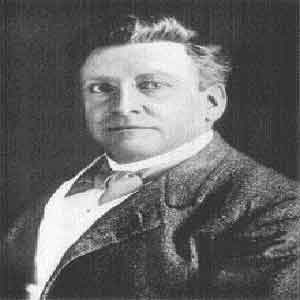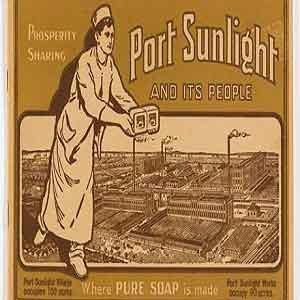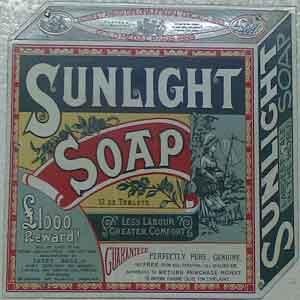William Lever
Introduction
William Lever was born on 19 September 1851 at 6 Wood Street, Bolton, Lancashire, England. He was the eldest son and the seventh child born to James Lever (1809–1897), a grocer, and Eliza Hesketh, daughter of a cotton mill manager. He was educated at Bolton Church Institute between 1864 and 1867 and worked in the family grocery business from 1867 until he was given junior partnership in 1872.Lever was a member of the Congregationalist Church and applied its ideals in his business life. On 17 April 1874 he married Elizabeth Ellen Hulme, daughter of a draper and neighbour from Wood Street, at the Church of St Andrew and St George (then Congregational, now United Reformed) in Bolton. William, their only surviving child, was born at Thornton Hough in 1888.
Lever moved to Thornton Hough in 1888 and bought Thornton Manor in 1893. He subsequently bought the village which he developed as a model village. His London home was The Hill at Hampstead, bought in 1904. He bought and demolished neighbouring Heath Lodge in 1911 to extend the garden. The Hill was his main home from 1919. In 1899 he bought Rockhaven in Horwich and the Rivington estate in early 1900. He built a wooden bungalow on the slopes of Rivington Pike in 1902 which was burned down in an arson attack in 1913 by suffragette, Edith Rigby. Its stone replacement was his summer home until his death.
The Start
After working for his father's wholesale grocery business, in 1886 he established a soap manufacturing company, Lever Brothers, with his brother James. It is now part of Unilever. It was one of the first companies to manufacture soap from vegetable oils, and with Lever's business acumen and marketing practices, produced a great fortune.
In 1887, Lever looking to expand his business, bought 56 acres (230,000 m2) of land on the Wirral in Cheshire between the River Mersey and the railway line at Bebington. This site became Port Sunlight where he built his works and a model village to house its employees. From 1888, Port Sunlight village offered decent living conditions in the belief that good housing would ensure a healthy and happy workforce. The community was designed to house and support the workers. Life in Port Sunlight included intrusive rules and implied mandatory participation in activities. The tied cottages meant that a worker losing his or her job could be almost simultaneously evicted. Even workers social lives were policed from head office. W.H Lever stated "a good workman may have a wife of objectionable habits, or may have objectionable habits himself, which make it undesirable for us to have him in the village."
Lever's rival in the soap industry was A & F Pears. Andrew Pears had taken the lead in using art for marketing by buying paintings such as "Bubbles" by John Everett Millais to promote its products, which Lever also wanted to do in 1886. Three years later Lever bought ‘The New York Frock’ by William Powell Frith to promote his firm's product Sunlight soap.
In 1906 Lever, together with Joseph Watson of Leeds and several other large soap manufacturers, established a monopoly soap trust, in imitation of similar combinations established in the USA following John D. Rockefeller's organisation of the Standard Oil Co. as a trust in 1882. Lever believed such an organization would bring benefits to the consumer as well as the manufacturer, through economies of scale in purchasing and advertising. The scheme was launched when President Roosevelt had just launched his trust-busting policy in America. The British press, in particular the Daily Mail, of which he had been one of the largest advertising customers, was virulently opposed to the scheme, and aroused popular hostility urging a boycott of trust brands and making what were later proved in court to be libellous assertions as to the constituent ingredients of the soaps concerned. All participants in the trust suffered severe losses to profits and reputations, Lever estimated his loss at "considerably over half a million" combined with a reduction by a third in the value of his shareholding, the scheme was abandoned before the year's end.
Personal Life
Lever began collecting artworks in 1893 when he bought a painting by Edmund Leighton. In his later years, Leverhulme became deaf, he had a klaxon horn by his bed to wake him at 5 am. He took up ballroom dancing late in life. Throughout his life he thought the only healthy way to sleep was outdoors in the wind and the rain.
Leverhulme was involved with freemasonry and by 1902 was first initiate to a lodge bearing his name, William Hesketh Lever Lodge No. 2916, he later formed Leverhulme Lodge 4438. He saw freemasonry as a tool to reinforce the hierarchy within Lever Brothers. He was a founder of the Phoenix Lodge 3236 whilst an M.P in 1907 and a founder of St. Hilary Lodge No. 3591 founded 4 May 1912, then Past Pro-Grand Warden (P.P.G.W) and Immediate Past Master (I.P.M). He was appointed Senior Grand Warden of the Grand Lodge of Mark Master Masons of England in 1919 and co-founded a number of lodges. He was Provincial Senior Grand Warden of the Provincial Grand Lodge of Cheshire.
Lord Leverhulme died aged 74 of pneumonia at his home in Hampstead on 7 May 1925. His funeral was attended by 30,000 people. This British grocer put individual hunks of soap in pretty wrappers and named them Sunlight. Before then, shoppers would buy soap by asking store owners to cut up long bars into smaller blocks. When copycats imitated William Lever's immensely successful ploy, he began branding Sunlight as the soap of the working woman, claiming, among other things, that it helped preserve their youth. It was one of the first brands in the modern marketing sense. Though a tech juggernaut such as Apple Computer wants us believe that it thinks differently, its marketing strategy was cooked up a century ago by a British grocer.



